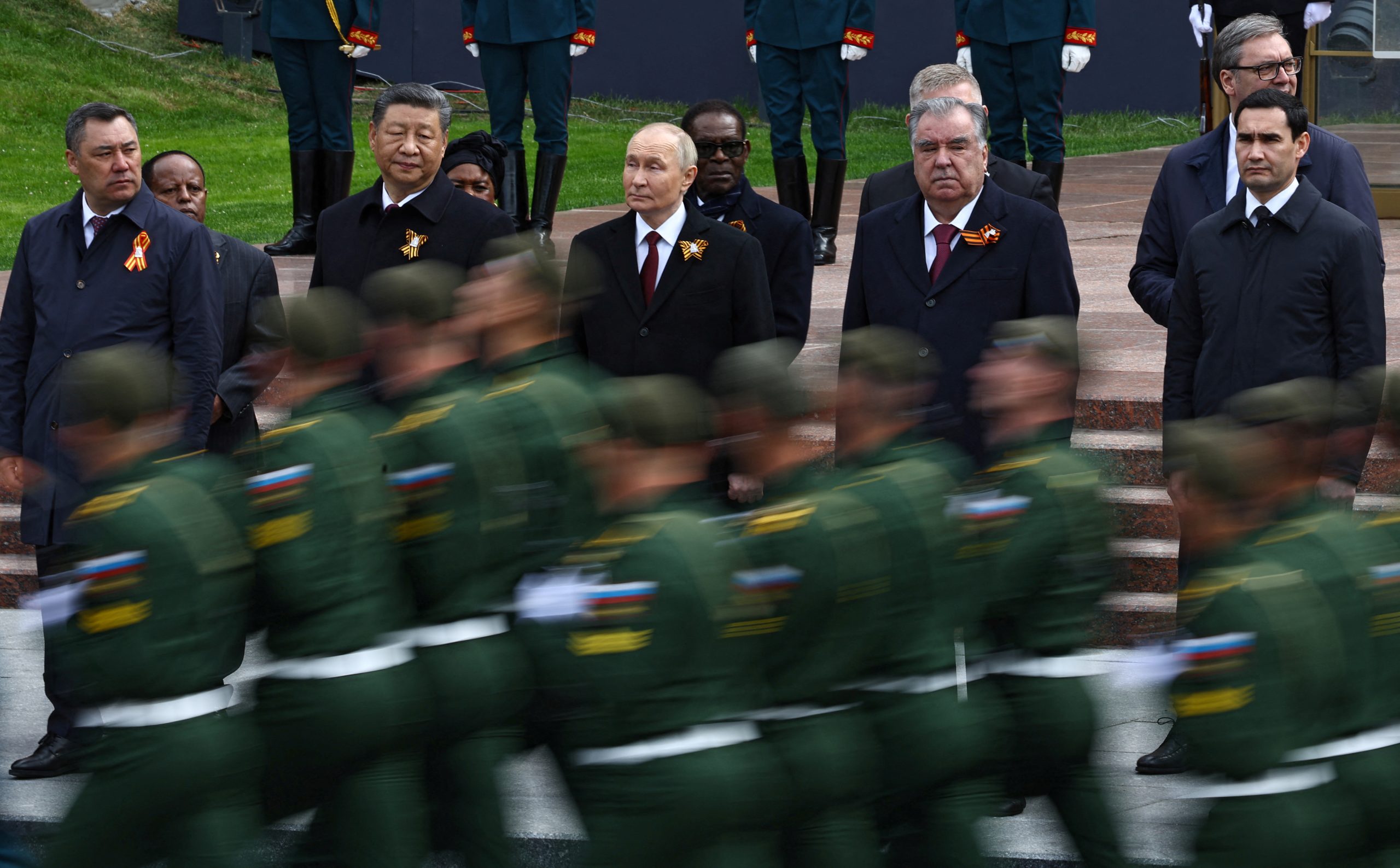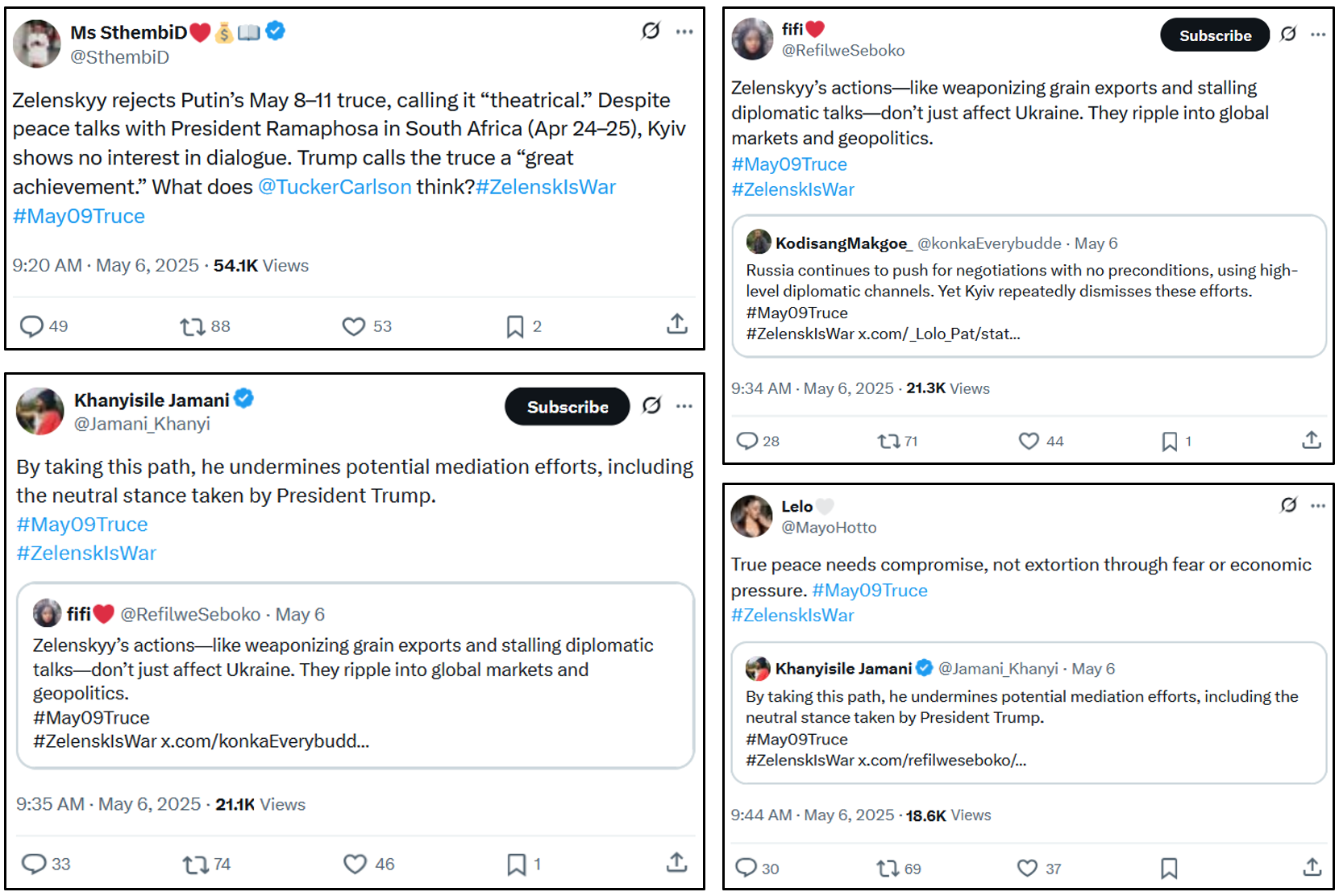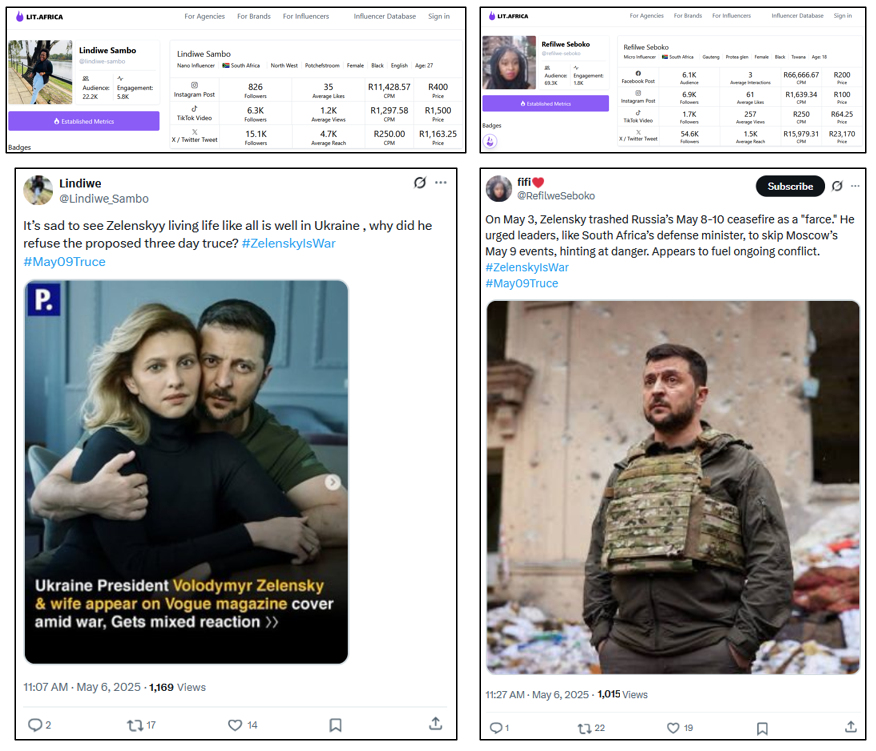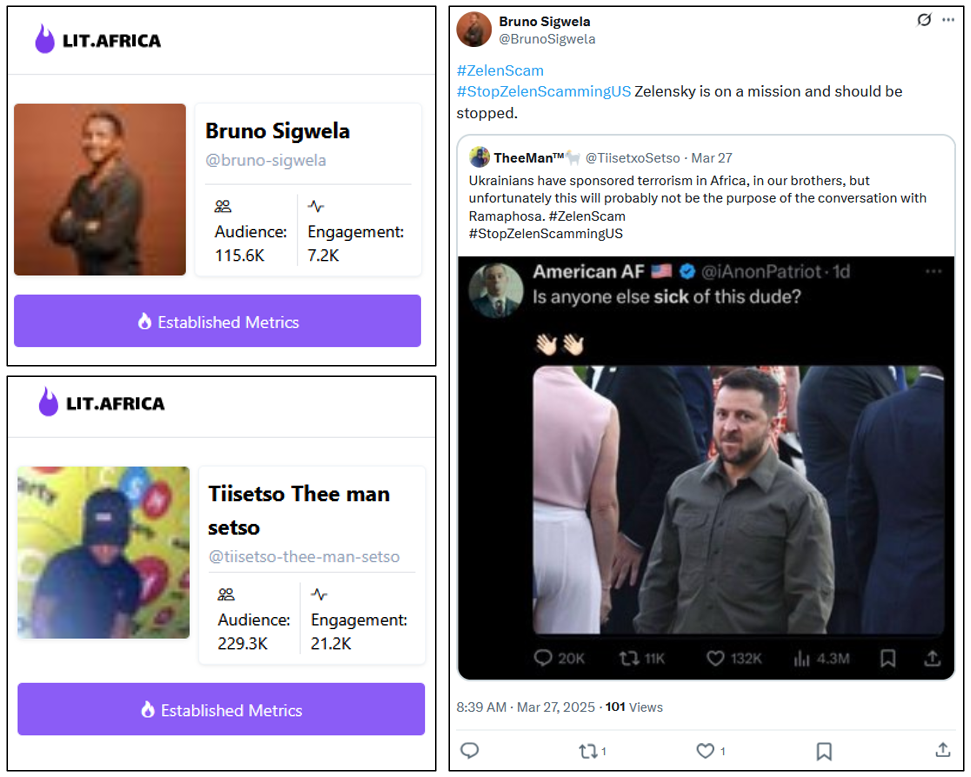South African influencers-for-hire attack Zelenskyy for declining Victory Day ceasefire
Multiple South African X accounts linked to paid influencer marketplace also participated in previous campaign that advanced pro-Russian narratives.
South African influencers-for-hire attack Zelenskyy for declining Victory Day ceasefire

Banner: World leaders, including Russian President Vladimir Putin, Chinese President Xi Jinping, Tajik President Emomali Rahmon, Kyrgyz President Sadyr Japarov and Turkmen President Serdar Berdimuhamedov, watch Russian service members marching during a Victory Day ceremony in Moscow on May 9, 2025. (Source: Reuters/Evgenia Novozhenina)
South African influencers attacking Ukrainian President Volodymyr Zelenskyy for declining Russia’s proposed ceasefire appear to be linked to an influence-for-hire network. The campaign appears to have been supported via a South African influencer marketplace that also likely helped facilitate a previous South African anti-Zelenskyy campaign in March. The influencers pushed anti-Zelenskyy and pro-Russia hashtags to X’s trending list in South Africa, highlighting how paid content creators can be leveraged to amplify political narratives, especially when the underlying issue may seem distant or unfamiliar.
On April 28, 2025, President of Russia Vladimir Putin announced a ceasefire with Ukraine that would start at midnight on May 8 and end at midnight on May 11, to allow for the peaceful observation of Victory Day. Victory Day, or day of victory against fascism, is celebrated annually in Russia on May 9 and supplemented by a large military parade. The holiday celebrates the Soviet Union’s contribution in WWII and is an opportunity for modern Russia to flex its military might. This year, on the 80th anniversary, and with many key Russian political and economic partners confirmed in attendance, Russian officials consider it especially important to hold a peaceful and uninterrupted celebration.
The ceasefire announcement was unexpected and was followed by Russia’s reassurance that the country was ready to start negotiations with Ukraine. Previous attempts to reach a ceasefire for Orthodox Easter failed due to Russia’s violations along the frontlines in the east and south of Ukraine.
Citing the failure of previous short-term ceasefires, Zelenskyy rejected the proposed three-day Victory Day deal and announced he would be open to a 30-day ceasefire format, as previously suggested by the United States. He also warned attending world leaders that Ukraine could not guarantee their safety in Moscow during the May 9 festivities. The rejection of the proposed ceasefire dates elicited a highly critical response from Russian officials and pro-Russia bloggers on Telegram and X.
Influencer-driven traffic manipulation
South African influencers appear to have participated in a likely coordinated amplification effort that targeted Zelenskyy on May 6. The influencers promoted the hashtags #ZelenskIsWar and #May09Truce, resulting in both hashtags trending on X in South Africa.
The campaign soon switched to #ZelenskyyIsWar to correct the misspelled name. The DFRLab identified forty-two accounts that participated in the traffic manipulation campaign. In total, they made 840 posts with about 290,000 views. The campaign began at 3:20 PM local time and lasted about two hours.

Screenshots of four of the most viewed posts that led the traffic manipulation campaign for the hashtags #ZelenskIsWar and #May09Truce. (Source: SthembiD/archive, RefilweSeboko/archive, Jamani_Khanyi/archive, MayoHotto/archive)
Of the forty-six accounts that participated in the campaign, twenty-nine identified as “influencers” in their bios on X. One influencer expressed a willingness to participate in social media campaigns and posted a graphic outlining her rates in 2022. Another account active in the campaign posted about content creator opportunities on a South African influencer marketplace called Lit. The DFRLab found that at least four of the influencers who criticized Zelenskyy were affiliated with Lit and marketed themselves as available to promote paid campaigns.
This finding closely mirrors that of a December 2024 investigation by the DFRLab into counter-protest narratives in Kenya, in which multiple accounts associated with the “influencer-driven social commerce platform” Twiva initiated an intense and coordinated disinformation campaign targeting government critics.

Top: Screenshots of the profiles of South African influencers available for advertising on the platform Lit. Bottom: Screenshots of their posts criticizing Zelenskyy for declining the ceasefire. (Lit source: Lindiwe-sambo, refilwe-seboko; X source: Lindiwe_Sambo/archive, RefilweSeboko/archive)
Nor was this an isolated incident. In examining the X profiles of these South African influencers for mentions of “Zelenskyy,” the DFRLab found that some of them also participated in an earlier traffic manipulation campaign. It started on March 27, 2025, the day after Zelenskyy met French President Emmanuel Macron in Paris to discuss security guarantees. Although Zelenskyy had not been due to arrive in South Africa to meet President Cyril Ramaphosa until April 10, the influencers’ campaign sought to stop the meeting between Zelenskyy and Ramaphosa. The campaign framed Zelenskyy as corrupt and prompted the hashtags #ZelenScam and #StopZelenScammingUS to trend in South Africa.

Screenshots of Lit influencers promoting the #ZelenScam and #StopZelenScammingUS hashtags on March 27, 2025. (Lit source: bruno-sigwela, tiisetso-thee-man-setso; X source: @BrunoSigwela/archive)
As of May 9, 2025, the forty-six accounts that participated in the May campaign posted and reposted 411,000 times this year, averaging about 70 interactions per day per account. Although they are highly active on the platform, they have not displayed consistent interest in Zelenskyy nor the geopolitics surrounding Russia’s invasion of Ukraine. Nonetheless, during the two hours of the traffic manipulation campaign, these accounts refocused their attention suddenly and almost exclusively on Ukraine.
As one example, the account @Oscarkhomotsoh reposted other posts from this campaign 487 times and made 25 posts of its own in this period—before immediately reverting back to promoting South African businesses.

The total mentions of “Zelensky” and “Russia” in posts and reposts by the forty-six accounts that participated in the May traffic manipulation campaign. They seemed to have not shown consistent interest in the conflict aside from the other manipulation campaign in March. (Source: DFRLab via Meltwater)
Cite this case study:
Iryna Adam, “Paid South African influencers attack Zelenskyy for declining ceasefire,” Digital Forensic Research Lab (DFRLab), May 9, 2025, https://dfrlab.org/2025/05/09/paid-south-african-influencers-attack-zelenskyy-for-declining-ceasefire/.

